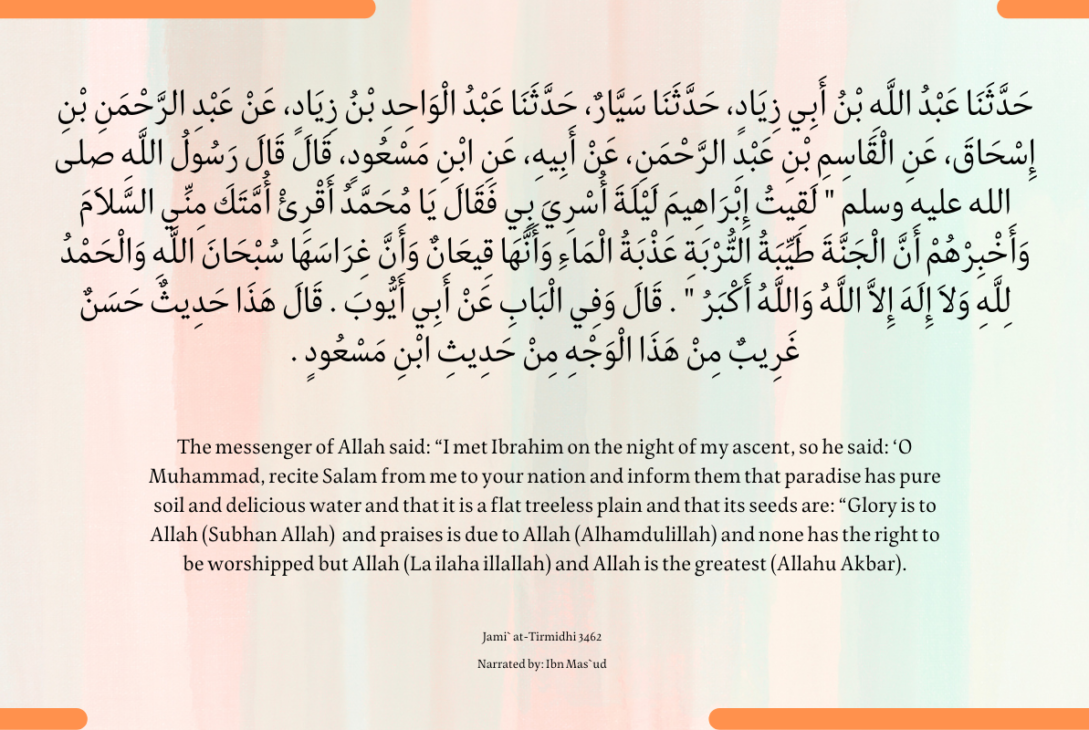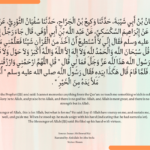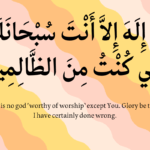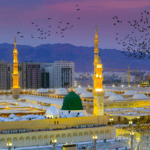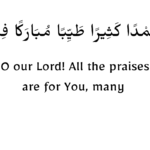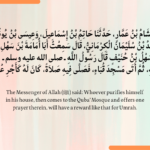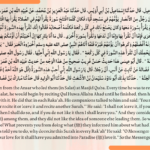- Hadith about Reciting Subhanallah, Alhamdulillah, La ilaha Illallah and Allahu Akbar
- Significance of the Night Journey (Isra' and Mi'raj)
- Message from Prophet Ibrahim (عَلَيْهِ ٱلسَّلَامُ)
- The Seeds: Dhikr and Its Importance
- Practical Application for Believers
- Spiritual Reflection
- The Power of Dhikr
- Cultivating Your Garden
- The Role of Gratitude
- The Unity of Believers
- Overcoming Challenges
- The Reward of Paradise
- Embracing the Lessons of Prophet Ibrahim
- Conclusion about Lessons from Prophet Ibrahim
- FAQ
بِسْمِ ٱللَّٰهِ ٱلرَّحْمَٰنِ ٱلرَّحِيمِ
As you wander through the gardens of your heart, do you ever stop to consider the seeds you are sowing? Are they seeds of faith, of hope, of devotion? Or are they weeds of doubt, of fear, of distraction?
The Prophet Ibrahim, a guiding light in the path of righteousness, offers us a profound lesson in cultivating our inner gardens, that they may bloom into a paradise of tranquility and joy.
In this sacred journey of lessons from Prophet Ibrahim (عَلَيْهِ ٱلسَّلَامُ), you are invited to explore the fertile soil of your soul, and to plant the seeds of devotion that will flourish into a garden of eternal beauty in Jannah.
Hadith about Reciting Subhanallah, Alhamdulillah, La ilaha Illallah and Allahu Akbar
حَدَّثَنَا عَبْدُ اللَّهِ بْنُ أَبِي زِيَادٍ، حَدَّثَنَا سَيَّارٌ، حَدَّثَنَا عَبْدُ الْوَاحِدِ بْنُ زِيَادٍ، عَنْ عَبْدِ الرَّحْمَنِ بْنِ إِسْحَاقَ، عَنِ الْقَاسِمِ بْنِ عَبْدِ الرَّحْمَنِ، عَنْ أَبِيهِ، عَنِ ابْنِ مَسْعُودٍ، قَالَ قَالَ رَسُولُ اللَّهِ صلى الله عليه وسلم ” لَقِيتُ إِبْرَاهِيمَ لَيْلَةَ أُسْرِيَ بِي فَقَالَ يَا مُحَمَّدُ أَقْرِئْ أُمَّتَكَ مِنِّي السَّلاَمَ وَأَخْبِرْهُمْ أَنَّ الْجَنَّةَ طَيِّبَةُ التُّرْبَةِ عَذْبَةُ الْمَاءِ وَأَنَّهَا قِيعَانٌ وَأَنَّ غِرَاسَهَا سُبْحَانَ اللَّهِ وَالْحَمْدُ لِلَّهِ وَلاَ إِلَهَ إِلاَّ اللَّهُ وَاللَّهُ أَكْبَرُ ” . قَالَ وَفِي الْبَابِ عَنْ أَبِي أَيُّوبَ . قَالَ هَذَا حَدِيثٌ حَسَنٌ غَرِيبٌ مِنْ هَذَا الْوَجْهِ مِنْ حَدِيثِ ابْنِ مَسْعُودٍ .
The messenger of Allah said: “I met Ibrahim on the night of my ascent, so he said: ‘O Muhammad, recite Salam from me to your nation and inform them that paradise has pure soil and delicious water and that it is a flat treeless plain and that its seeds are: “Glory is to Allah (Subhan Allah) and praises is due to Allah (Alhamdulillah) and none has the right to be worshipped but Allah (La ilaha illallah) and Allah is the greatest (Allahu Akbar).
Source: Jami` at-Tirmidhi 3462
Narrated by: Ibn Mas’ud (RA)
Hadith status: Hasan ghareeb
Significance of the Night Journey (Isra’ and Mi’raj)
Your journey to cultivate your garden in Jannah is not just about individual efforts, but also about understanding the significance of the Night Journey (Isra’ and Mi’raj) of Prophet Muhammad (ﷺ). This miraculous event holds profound lessons for you as you strive to create a paradise on earth and ultimately, in Jannah.
Meeting with Prophets
With every step you take towards cultivating your garden, remember that you are part of a long lineage of prophets who have walked this path before you.
During the Night Journey, Prophet Muhammad (ﷺ) met with Prophet Ibrahim, who conveyed a message of peace and blessings to the Muslim nation. This encounter signifies the connection between prophets across different eras, reminding you that your efforts to cultivate your garden are linked to the struggles and triumphs of those who came before you.
As you reflect on this meeting, remember that Prophet Ibrahim’s message was not just a greeting, but a reminder of the importance of gratitude and remembrance of Allah.
The seeds of your garden, just like the seeds of Paradise, are rooted in the declaration of Allah’s greatness and unity. May this encounter inspire you to nurture your garden with humility, gratitude, and a deep sense of connection to the prophets who have paved the way for you.
Unity of the Abrahamic Faiths
Unity of purpose and faith is crucial as you cultivate your garden in Jannah. The Night Journey reminds you that the prophets, including Ibrahim, Musa, Isa and Muhammad (ﷺ), share a common thread – the belief in one God, Allah. This unity transcends boundaries, emphasizing the importance of cooperation and mutual respect among believers.
Understanding the significance of this unity is crucial as you strive to create a harmonious and peaceful garden in Jannah. Recognize that your efforts are not isolated, but rather part of a larger tapestry of faith and devotion that weaves together the experiences of prophets and believers across different traditions.
By embracing this unity, you will find strength, guidance, and inspiration to nurture your garden and cultivate a deeper connection with Allah.
Message from Prophet Ibrahim (عَلَيْهِ ٱلسَّلَامُ)
One of the most profound lessons we can learn from Prophet Ibrahim’s life is the importance of cultivating our inner gardens, preparing ourselves for the ultimate paradise, Jannah. In this chapter, we will explore into the messages Prophet Ibrahim conveyed to us through the Prophet Muhammad (ﷺ).
Salam (Peace)
An angelic greeting echoes through eternity, a message of peace from Prophet Ibrahim to you, dear reader. “Recite Salam from me to your nation,” he says. In this simple yet profound phrase, Prophet Ibrahim reminds us that peace is not just a state of being, but a gift we can offer to one another.
As you cultivate your garden in Jannah, remember that peace is the fertile soil in which love, compassion, and kindness grow. It is the gentle rain that nourishes your soul, allowing you to flourish in the presence of the Divine.
In this Salam, Prophet Ibrahim invites you to partake in the harmony and serenity that permeate the righteous. As you receive this greeting, may your heart be filled with the tranquility that comes from knowing you are beloved by the Creator. May your spirit be soothed by the gentle breeze of peace, and may your soul be revitalized by the promise of eternal harmony.
Paradise Description
Peaceful vistas unfold before your eyes as Prophet Ibrahim paints a vivid picture of Jannah. He describes it as a realm with “pure soil and delicious water,” where the very essence of existence is infused with the sweetness of the Divine.
Imagine walking through this paradise, feeling the soft, unblemished earth beneath your feet, and savoring the taste of water that quenches not only your physical thirst but also your spiritual longing.
Description of this realm is not merely a physical portrayal; it is an invitation to experience the depths of spiritual nourishment that await you in Jannah. The “flat treeless plain” symbolizes the limitless expanse of the soul, unencumbered by the burdens of the world. Here, your heart can roam free, untethered by the constraints of time and space.
In this sublime description, Prophet Ibrahim offers you a glimpse into the essence of Jannah, where your soul can revel in the beauty and majesty of the Divine. As you cultivate your garden in Jannah, remember that the seeds of your efforts will yield a harvest of eternal bliss, where every moment is a testament to the glory of Allah.
The Seeds: Dhikr and Its Importance
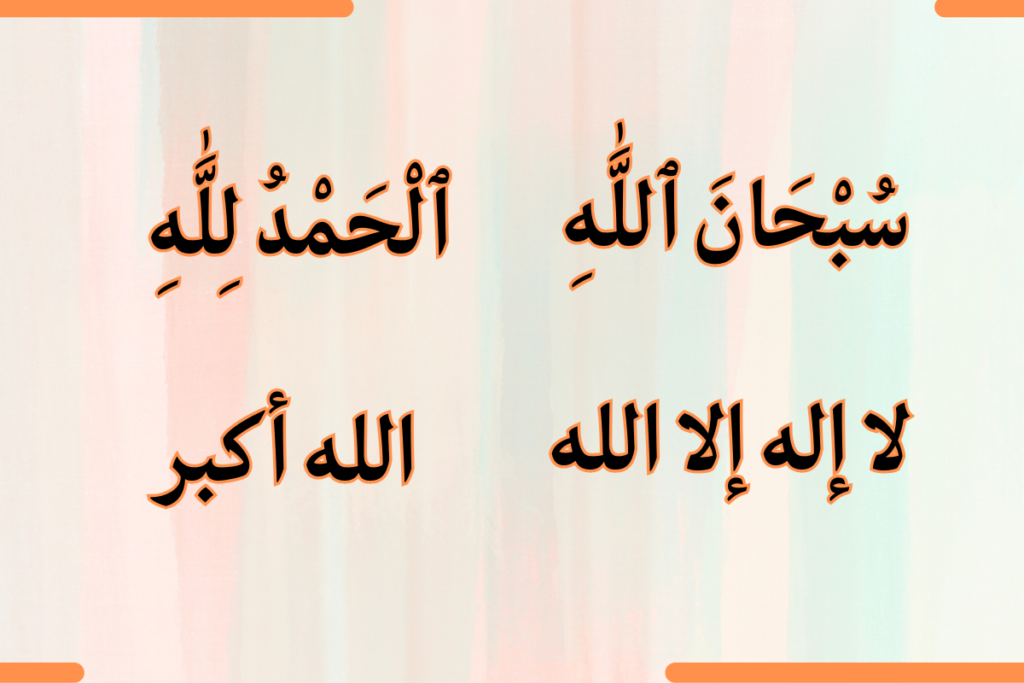
Despite the many distractions and challenges that surround you, cultivating your garden in Jannah requires a deep connection with the Divine. This connection is fostered through the remembrance of Allah, known as Dhikr. Just as a seed needs nourishment to grow, your soul needs the sustenance of Dhikr to flourish.
Subḥān Allāh (Glory is to Allah)
For every breath you take, every beat of your heart, and every moment of existence, you are surrounded by the glory of Allah. The seed of Subḥān Allāh is a declaration of Allah’s majesty and power. As you utter these words, you acknowledge that all glory belongs to Him, and that your existence is a testament to His greatness.
When you plant the seed of Subḥān Allāh in your heart, you begin to see the world through the lens of Allah’s glory. You recognize that every aspect of creation, from the intricate patterns on a leaf to the vast expanse of the universe, is a reflection of His majesty.
Al-ḥamdulillāh (All praise is due to Allah)
Importance is given to the One who deserves it most – Allah. The seed of Al-ḥamdulillāh is a recognition that all praise, gratitude, and thanks belong to Him. As you cultivate this seed, you begin to appreciate the countless blessings in your life, no matter how small they may seem.
Dhikr of Al-ḥamdulillāh is a powerful tool for cultivating gratitude. It shifts your focus from what’s lacking to the abundance that already exists in your life. As you praise Allah, you open yourself up to receiving more blessings and experiencing the joy that comes with a heart full of gratitude.
Al-ḥamdulillāh is not just a phrase; it’s a state of being. It’s a recognition that every moment, every breath, and every experience is a gift from Allah. When you embody this seed, you begin to see the world as a manifestation of Allah’s mercy and generosity.
Lā ilāha illallāh (None has the right to be worshipped but Allah)
The seed of Lā ilāha illallāh is a declaration of Allah’s oneness and uniqueness. It’s a recognition that there is no other deity worthy of worship, no other power that can rival Allah’s. As you plant this seed in your heart, you begin to purify your intentions and focus your worship solely on Allah.
When you utter Lā ilāha illallāh, you are affirming that Allah is the source of all guidance, wisdom, and strength. You are acknowledging that He is the only One who can provide true fulfillment and happiness.
Another aspect of Lā ilāha illallāh is the recognition of Allah’s mercy and forgiveness. When you surrender to His will, you open yourself up to receiving His guidance and pardon. This seed has the power to transform your relationship with Allah, allowing you to experience a deeper sense of peace and contentment.
Allāhu Akbar (Allah is the greatest)
One of the most powerful seeds you can plant in your heart is the declaration of Allāhu Akbar. This seed is a testament to Allah’s greatness, a recognition that He is beyond human comprehension.
When you utter Allāhu Akbar, you are affirming that Allah is the greatest power in the universe, the One who transcends all limitations and boundaries. You are acknowledging that His wisdom, mercy, and justice are beyond human understanding.
Allahu Akbar is not just a phrase; it’s a state of awe and reverence. It’s a recognition that Allah is the source of all creation, the One who sustains and nourishes everything in existence. When you embody this seed, you begin to see the world as a manifestation of Allah’s greatness and majesty.
Practical Application for Believers
To cultivate your garden in Jannah, you must first cultivate your heart and soul on earth. The lessons from Prophet Ibrahim’s life serve as a guiding light on this journey.
Daily Practice
The whispers of your soul are the seeds that will bloom into a garden of righteousness in Jannah. As you go about your daily life, remember to nurture these seeds with the pure soil of Paradise. Recite the phrases that Prophet Ibrahim entrusted to the Messenger of Allah (ﷺ): “Glory is to Allah (Subḥān Allāh), all praise is due to Allah (Al-ḥamdulillāh), and ‘none has the right to be worshipped but Allah’ (Lā ilāha illallāh), and Allah is the greatest (Allāhu Akbar).” Let these words be the morning dew that revives your spirit and the evening breeze that soothes your soul.
As you cultivate your daily practice, remember that every action, every thought, and every intention is a seed that will bear fruit in Jannah. Let your daily routine be a reflection of your love for Allah and your desire to please Him. Make time for prayer, charity, and kindness, for these are the fertilizers that will make your garden grow.
Community and Unity
On the path to cultivating your garden in Jannah, you are not alone. You are part of a community of believers who share your vision and your values. Reach out to them, and together, create a tapestry of love, compassion, and unity.
In the words of the Messenger of Allah (ﷺ), convey the message of peace and harmony to your fellow believers. Remember that your garden in Jannah is not isolated from the gardens of others; rather, they are interconnected, forming a majestic landscape of faith and devotion. As you tend to your own garden, also nurture the gardens of those around you, that together, you may create a paradise on earth and in Jannah.
Believers, as you strive to cultivate your garden in Jannah, remember that community and unity are necessary components of this journey. By supporting and uplifting one another, you will create a symphony of love and harmony that will resonate throughout eternity.
Spiritual Reflection
Unlike the fleeting pleasures of this world, the garden of Jannah promises eternal bliss and serenity. As you reflect on the lessons of Prophet Ibrahim, you begin to realize that cultivating your garden in Jannah requires a deep connection with your Creator.
Personal Reflection
Reflecting on your own journey, you may ask yourself: What are the seeds I am planting in my garden today? Are they the seeds of faith, hope, and charity, or are they the weeds of doubt, fear, and selfishness? Take a moment to introspect and evaluate the intentions behind your actions. Are you seeking to please Allah or seeking the validation of others?
As you probe deeper into your heart, you may discover areas where you need to prune the weeds of negativity and nurture the flowers of positivity. Do not forget, every thought, every word, and every action has consequences in the hereafter. By reflecting on your personal growth, you can identify the areas that require attention and make amends to ensure a bountiful harvest in Jannah.
Inspiration and Motivation
With the promise of Jannah as your guiding light, you are motivated to strive for excellence in your spiritual journey. The words of Prophet Ibrahim, as conveyed by the Messenger of Allah (ﷺ), inspire you to focus on the essence of your faith: the remembrance of Allah, gratitude, and the declaration of His Oneness.
For instance, the seeds mentioned in the hadith – “Glory is to Allah (Subḥān Allāh) [and] all praise is due to Allah (Al-ḥamdulillāh) and ‘none has the right to be worshipped but Allah’ (Lā ilāha illallāh), and Allah is the greatest (Allāhu Akbar)” – serve as a reminder of the importance of constant remembrance and gratitude.
By incorporating these phrases into your daily routine, you can cultivate a sense of awe and reverence for your Creator, which will, in turn, inspire you to live a life pleasing to Him.
The Power of Dhikr
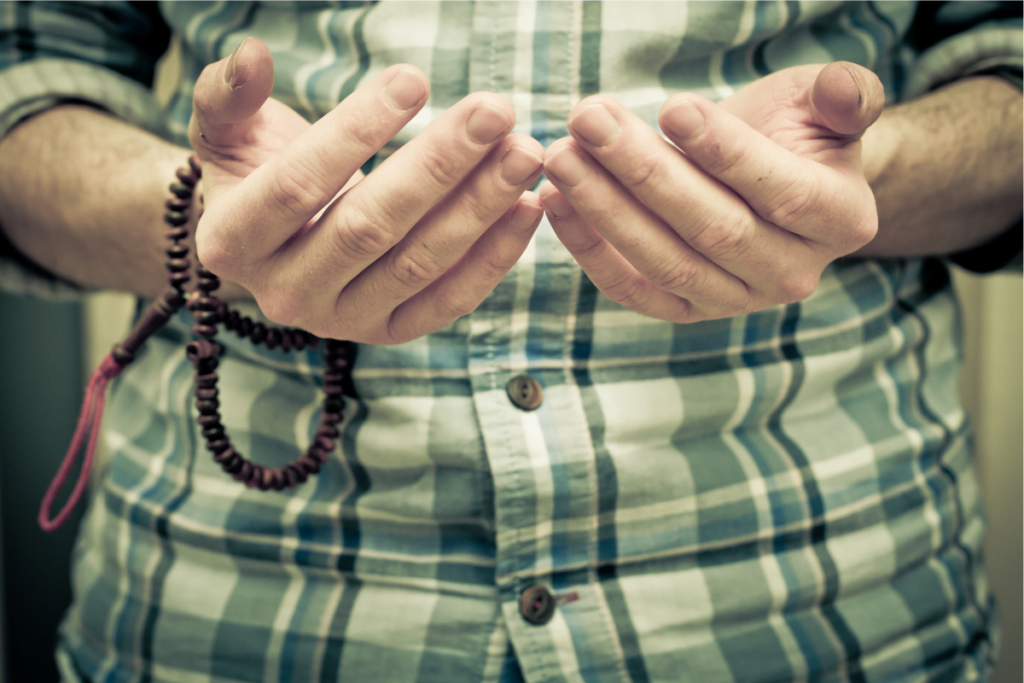
After traversing the realms of faith, you arrive at the threshold of Jannah, where the sweet fragrance of Paradise envelops your soul. As you prepare to cultivate your garden in this blessed land, you are reminded of the importance of dhikr, the remembrance of Allah, in nurturing the beauty and bounty of your spiritual haven.
Purification of the Heart
The gentle whispers of dhikr have the power to purify your heart, washing away the impurities of doubt and uncertainty. As you recite the sacred phrases, “Glory is to Allah (Subḥān Allāh),” “all praise is due to Allah (Al-ḥamdulillāh),” and “none has the right to be worshipped but Allah (Lā ilāha illallāh),” you feel the weight of your ego lifting, allowing the light of faith to illuminate your inner being.
The Messenger of Allah (ﷺ) emphasized the significance of dhikr, saying, “When anyone of you utters the testimony, none has the right to be worshipped but Allah, sincerely, from the bottom of his heart, Paradise becomes incumbent upon him.”
As you repeat these words, you are, in essence, declaring your devotion to the One, surrendering your will to His divine plan, and opening yourself to the infinite possibilities of His mercy and compassion.
Protection from Sin
Any seedling of faith, no matter how tender, requires protection from the weeds of sin and temptation. Dhikr serves as a powerful shield, deflecting the whispers of Shaytan and fortifying your resolve to walk the straight path.
As you cultivate your garden in Jannah, the constant remembrance of Allah becomes your safeguard against the pitfalls of disobedience. With each recitation of “Allah is the greatest (Allāhu Akbar),” you are reminded of the majesty and power of your Creator, and the fleeting nature of worldly desires.
Plus, the more you engage in dhikr, the more you become attuned to the subtle whispers of your heart, allowing you to detect the subtle stirrings of sin and nip them in the bud.
In this way, dhikr becomes a potent tool in your journey towards spiritual growth and self-purification, enabling you to tend to your garden in Jannah with greater care and devotion.
Cultivating Your Garden
Not just a physical haven, your garden in Jannah is a reflection of your spiritual growth and devotion. It is a sanctuary where your soul can flourish, nourished by the pure soil and delicious water of faith. As you tend to your garden, you are cultivating a deeper connection with the Divine, and sowing the seeds of righteousness that will bloom into eternal bliss.
Planting the Seeds of Faith
Your journey begins with the simplest yet most profound act of faith: uttering the words of praise and devotion. Like the seeds that Prophet Ibrahim (peace be upon him) spoke of, your declarations of “Glory is to Allah (Subḥān Allāh)”, “all praise is due to Allah (Al-ḥamdulillāh)”, “none has the right to be worshipped but Allah (Lā ilāha illallāh)”, and “Allah is the greatest (Allāhu Akbar)” plant the roots of faith deep within your heart. These words are not mere phrases, but a testament to your surrender and commitment to the Divine plan.
As you repeat these words, you are inviting the mercy and blessings of Allah into your life. You are acknowledging His greatness, His power, and His wisdom. You are, in essence, surrendering to His will, and allowing His guidance to shape your thoughts, words, and actions. And it is here, in this fertile soil of faith, that your garden in Jannah begins to take root.
Nurturing Spiritual Growth
One of the most imperative aspects of cultivating your garden is nurturing spiritual growth. This requires consistent effort, patience, and dedication. Just as a gardener must tend to their plants daily, providing them with the necessary nourishment and care, you must tend to your soul, providing it with the spiritual sustenance it needs to thrive.
You do this by staying connected to the Divine through prayer, reflection, and acts of kindness. You do this by seeking knowledge, wisdom, and guidance from the Quran and the teachings of the Prophet (peace be upon him). You do this by surrounding yourself with people who inspire and uplift you, and by distancing yourself from those who would seek to harm or corrupt your spirit.
Planting the seeds of faith is just the beginning. Nurturing spiritual growth requires a lifelong commitment to self-reflection, self-improvement, and self-purification. It requires a willingness to confront your weaknesses, to let go of your ego, and to surrender to the will of Allah. But the rewards are immeasurable, for in nurturing your spiritual growth, you are cultivating a garden in Jannah that will bloom with eternal beauty and radiance.
The Role of Gratitude
For as you tend to your garden in Jannah, remember that gratitude is the fertile soil that allows your blessings to flourish.
Recognizing Allah’s Blessings
Bounties surround you, dear gardener, and it is imperative to acknowledge the blessings that Allah has bestowed upon you. As you walk through the gates of Paradise, take a moment to reflect on the abundance that surrounds you.
The pure soil beneath your feet, the delicious water that quenches your thirst, and the serene landscape that stretches before you are all testaments to Allah’s infinite mercy. Recognize these blessings, dear one, and let them fill your heart with joy and appreciation.
As you gaze upon the beauty of Jannah, remember that every blessing is a gift from Allah, a reminder of His love and care for you. Let the realization of these blessings sink deep into your soul, that you may cultivate a heart that is humble, thankful, and surrendered to His will.
Expressing Thankfulness
On the wings of gratitude, your heart soars, dear gardener, and your garden flourishes. Expressing thankfulness is not only a way to acknowledge Allah’s blessings but also a means to attract more blessings into your life. As the Messenger of Allah (ﷺ) said, the seeds of Jannah are the words of praise and gratitude, “Glory is to Allah (Subḥān Allāh), all praise is due to Allah (Al-ḥamdulillāh), and none has the right to be worshipped but Allah (Lā ilāha illallāh), and Allah is the greatest (Allāhu Akbar).” Repeat these words, dear one, and let them become the rhythm of your heart, the melody that harmonizes your soul with the divine.
Understanding the power of gratitude, you begin to see that it is not just a feeling but a choice, a conscious decision to focus on the blessings rather than the challenges. As you cultivate gratitude, you will find that your heart becomes more receptive to Allah’s guidance, and your garden in Jannah grows more vibrant, more resilient, and more beautiful with each passing day.
The Unity of Believers
Now, as you strive to cultivate your garden in Jannah, you must remember that this journey is not solitary. You are part of a community of believers, united in your quest for spiritual growth and closeness to Allah.
Shared Practices and Values
Unity of purpose is the foundation upon which the edifice of faith is built. You share with your fellow believers a common set of practices and values that bring you closer to Allah and to each other. The daily prayers, the fasting during Ramadan, the pilgrimage to Makkah – these rituals and many others serve as a reminder that you are part of a larger whole, a ummah that transcends borders and boundaries.
As you perform these acts of worship, you are not alone; you are joined by millions of others around the world who are similarly committed to the path of righteousness.
In this shared pursuit of spiritual excellence, you find comfort and strength. You draw inspiration from the examples of those who have come before you, like Prophet Ibrahim, who demonstrated unwavering dedication to Allah’s will. You, too, can tap into this collective energy, allowing it to fuel your own journey towards spiritual growth and self-improvement.
Strengthening Bonds of Faith
On the path to Jannah, you will encounter many fellow travelers who share your aspirations and values. It is through these relationships that you can strengthen the bonds of faith, creating a network of support and encouragement that will sustain you throughout your journey. As the Messenger of Allah (ﷺ) said, “A believer is a mirror to another believer.”
With every interaction, every conversation, and every act of kindness, you have the opportunity to reflect the beauty of Islam to those around you. By doing so, you not only strengthen your own faith but also inspire others to do the same. This ripple effect of goodness can have a profound impact on your community, fostering an environment of love, compassion, and mutual support.
With the words of Prophet Ibrahim echoing in your heart – “Glory is to Allah (Subḥān Allāh), [and] all praise is due to Allah (Al-ḥamdulillāh) and ‘none has the right to be worshipped but Allah’ (Lā ilāha illallāh), and Allah is the greatest (Allāhu Akbar)” – you can deepen your connection with your fellow believers, creating a sense of unity and purpose that will carry you through even the most challenging times.
Overcoming Challenges
Once again, as you initiate on the journey of cultivating your garden in Jannah, you will inevitably face challenges that test your resolve and faith. But fear not, for it is in these moments of adversity that you can draw strength from the lessons of Prophet Ibrahim.
Perseverance and Patience
One of the most significant challenges you will face is the temptation to give up when the going gets tough. The path to cultivating a garden in Jannah is not an easy one, and there will be times when you feel like abandoning your efforts. But Prophet Ibrahim teaches us the importance of perseverance and patience.
Remember how he remained steadfast in his faith despite the trials and tribulations he faced, including being thrown into the fire by his own people.
In the same way, when you face obstacles in your journey, draw upon the patience and perseverance of Prophet Ibrahim. Remember that every challenge is an opportunity to grow stronger and closer to Allah. So, take a deep breath, steady yourself, and continue to nurture your garden, knowing that the rewards will be worth the struggle.
Seeking Guidance and Support
The lessons of Prophet Ibrahim is not limited to his own experiences, but also extends to the guidance he received from Allah. The Messenger of Allah (ﷺ) said: “I met Ibrahim on the night of my ascent, so he said: ‘O Muhammad, recite Salam from me to your nation, and inform them that Paradise has pure soil and delicious water, and that it is a flat treeless plain, and that its seeds are: “Glory is to Allah (Subḥān Allāh) [and] all praise is due to Allah (Al-ḥamdulillāh) and ‘none has the right to be worshipped but Allah’ (Lā ilāha illallāh), and Allah is the greatest (Allāhu Akbar).”
The wisdom of Prophet Ibrahim reminds us that seeking guidance and support is important in our journey to cultivate a garden in Jannah. When you feel lost or uncertain, turn to the Quran and the teachings of the Prophet (ﷺ) for guidance. Seek the support of fellow believers who can offer encouragement and advice. And most importantly, turn to Allah in prayer, asking for His mercy and guidance.
With every challenge you face, remember that you are not alone. You have the guidance of Prophet Ibrahim, the wisdom of the Quran, and the support of the Muslim community to help you overcome any obstacle.
So, don’t be afraid to ask for help, and don’t be discouraged by setbacks. Instead, persevere, seek guidance, and trust in Allah’s plan for you.
The Reward of Paradise
Despite the trials and tribulations you may face in this life, the reward of Paradise awaits those who remain steadfast in their faith and cultivate their gardens in Jannah.
Eternal Bliss and Joy
With every step you take towards righteousness, you draw closer to the eternal bliss and joy that awaits you in Paradise. The Prophet Muhammad (ﷺ) described Jannah as a place with “pure soil and delicious water,” where the very essence of existence is infused with the sweetness of Allah’s mercy.
In this realm, your heart will be filled with an unshakeable sense of peace, and your soul will be nourished by the gentle rains of Allah’s blessings. You will bask in the radiance of His love, and your spirit will soar on the wings of eternal joy.
Reunion with the Prophets
To be among the righteous in Paradise is to be in the company of the noble prophets who have guided humanity throughout the ages. You will walk alongside Ibrahim, Musa, Isa, and Muhammad (ﷺ), and bask in the wisdom and compassion that radiates from their presence.
In their midst, you will find solace and inspiration, as you share in the stories of their struggles and triumphs. You will learn from their examples, and be motivated to continue cultivating your garden in Jannah, that it may flourish with an abundance of love, mercy, and wisdom.
Bliss will be your constant companion, as you engage in conversations that will uplift and enlighten your soul. You will marvel at the wonders of Allah’s creation, and rejoice in the knowledge that you have finally found your true home, where love, peace, and harmony reign supreme.
Embracing the Lessons of Prophet Ibrahim
Many of us have heard the story of Prophet Ibrahim and his unwavering trust in Allah. His journey is a testament to the power of faith and devotion. As we strive to cultivate our gardens in Jannah, we can learn valuable lessons from his experiences. Imam Omar Suleiman beautifully summarizes the advice of Prophet Ibrahim on how to grow trees in Jannah in his Facebook post Omar Suleiman – Advice from Prophet Ibrahim on how to grow trees in Jannah. Let us investigate deeper into the lessons we can glean from his life.
Humility and Devotion
With every step you take towards cultivating your garden in Jannah, remember that it is not about your own abilities or accomplishments. It is about surrendering to the will of Allah and recognizing your limitations.
Prophet Ibrahim’s humility and devotion to Allah are exemplary. He trusted in Allah’s plan, even when it seemed impossible. You too can cultivate this humility by acknowledging your dependence on Allah and seeking His guidance in every aspect of your life.
As you tend to your garden, remember that it is not about the fruits of your labor, but about the labor itself. The act of cultivating your garden is an act of worship, a demonstration of your love and devotion to Allah.
Just as Prophet Ibrahim was willing to sacrifice his son Ismail, you too must be willing to let go of your attachments and desires, trusting that Allah has a better plan for you.
Trust and Surrender
With trust and surrender, you open yourself up to the infinite possibilities of Allah’s mercy and blessings. Prophet Ibrahim’s trust in Allah was unwavering, even in the face of uncertainty and adversity. You too can cultivate this trust by letting go of your fears and doubts, and instead, placing your faith in Allah’s plan.
As you navigate the ups and downs of life, remember that every challenge is an opportunity to grow closer to Allah. Trust that He is always working for your benefit, even when you cannot see the bigger picture. A beautiful garden in Jannah is not just a reward for your efforts, but a reflection of your trust and surrender to Allah’s will.
A garden in Jannah is not just a physical space, but a state of being. It is a reflection of your inner peace, your connection with Allah, and your trust in His plan. As you strive to cultivate your garden, remember that it is not about the external manifestations, but about the internal transformations that take place within you. May the lessons of Prophet Ibrahim guide you on your journey towards cultivating a beautiful garden in Jannah.
Conclusion about Lessons from Prophet Ibrahim
As a reminder, dear soul, the journey of cultivating your garden in Jannah is a lifelong pursuit, one that requires dedication, patience, and devotion. Just as Prophet Ibrahim’s unwavering faith and trust in Allah guided him through the trials and tribulations of his life, so too can you draw inspiration from his example to nurture your own spiritual growth.
May the seeds of faith, hope, and love that you sow in your heart today bloom into a radiant garden of righteousness in the hereafter. May the soil of your soul be fertile and pure, receptive to the divine guidance that flows from the heavens above. And may the fruits of your labor be sweet and abundant, a testament to the transformative power of faith and devotion. For in the end, it is not the grandeur of our deeds that will earn us a place in Paradise, but the sincerity of our intentions and the purity of our hearts.
FAQ
Q: What is the significance of the Prophet’s encounter with Ibrahim in the Hadith?
A: The encounter between the Prophet Muhammad (ﷺ) and Prophet Ibrahim on the night of his ascent holds great significance. It emphasizes the connection between the prophets and the continuity of their messages. Prophet Ibrahim’s message to the Prophet Muhammad (ﷺ) serves as a reminder to the Muslim community about the nature of Paradise and the importance of certain phrases in achieving closeness to Allah.
Q: What does the Hadith reveal about the nature of Paradise?
A: According to the Hadith, Paradise has pure soil and delicious water, and it is a flat treeless plain. This description contrasts with the common earthly experiences of gardens, which often have varying terrain and vegetation. The unique characteristics of Paradise highlight its perfection and beauty, making it an ultimate goal for believers.
Q: What are the “seeds” of Paradise mentioned in the Hadith, and what is their significance?
A: The “seeds” of Paradise mentioned in the Hadith are the phrases “Glory is to Allah (Subḥān Allāh)”, “all praise is due to Allah (Al-ḥamdulillāh)”, “none has the right to be worshipped but Allah” (Lā ilāha illallāh), and “Allah is the greatest” (Allāhu Akbar). These phrases are considered the seeds of Paradise because they represent the fundamental principles of Islam and the essence of a believer’s relationship with Allah. Reciting these phrases regularly can help cultivate a strong connection with Allah, ultimately leading to Paradise.
